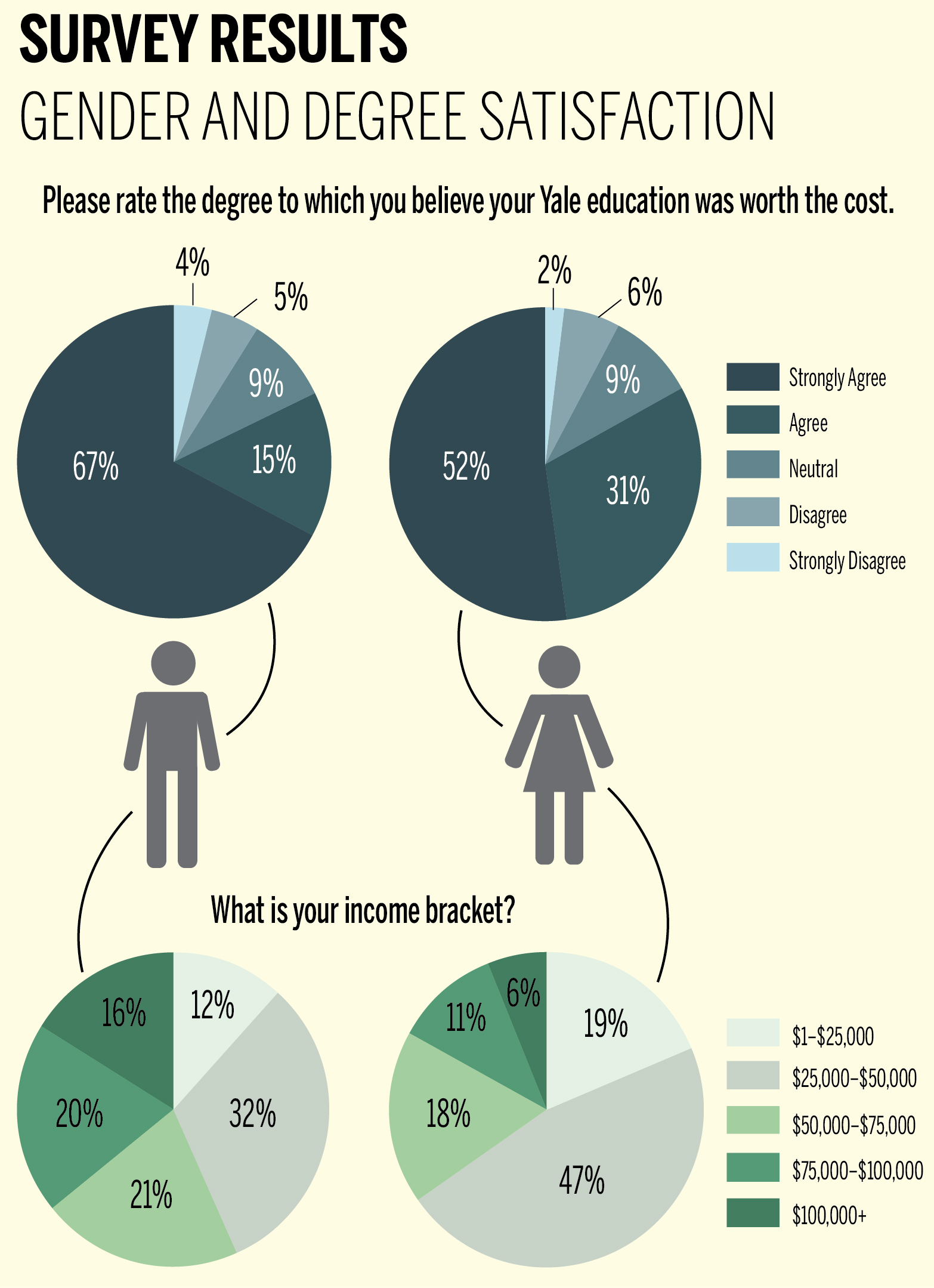
In terms of income and satisfaction with their education, it appears the deck is stacked against female Yale graduates.
On Sept. 29, the Chronicle of Higher Education published the results of a Gallup-Purdue Index survey that found that 50 percent of 30,000 college alumni nationwide strongly agreed that their college degrees were worth the cost. At research universities like Yale, a slightly higher-than-average 53 percent of respondents felt the same.
In response to the Gallup numbers, the News distributed a comprehensive survey to the classes of 2013 and 2014 asking whether they believed their education justified the cost of Yale tuition. Three hundred and sixty-seven responded — 177 men, 187 women and three individuals who did not identify with either gender — and the results suggest that female graduates have lower incomes and are less satisfied with their education than their male counterparts.
While a similar percentage of female and male graduates viewed their Yale educations positively, their degree of approval differed markedly: 67 percent of male graduates “strongly agreed” and 15 percent “agreed” that their Yale education was worth the cost of tuition, while 52 percent of female graduates “strongly agreed” and 31 percent “agreed” their tuition was worth the cost.
Not only are female graduates less satisfied with the worth of their Yale degrees, but they also have lower incomes on average, according to survey data. Of the 335 respondents who reported earnings, 160 were men, 187 were women and three did not identify with either gender. 66 percent of those women are currently earning less than $50,000 per year, as compared to the 44 percent of men in the same income bracket. And while 36 percent of male graduates are earning more than $75,000 per year, just 17 percent of women fell in the same bracket.
Of the administrators and 18 alumni interviewed more extensively by the News, the majority said gaps in income and satisfaction can be explained by divergent career interests. Because women tend to gravitate toward less lucrative professions, those interviewed said, their subsequently lower incomes might lead them to view their Yale educations more negatively in hindsight. However, others said that a hostile environment on campus could augment feelings of dissatisfaction amongst females.
Marianne LaFrance, a professor of women, gender and sexuality studies, said the inhospitable atmosphere women often face on campus results in less worthwhile educational experiences.
“In many studies, women have been described as encountering a ‘chilly climate’ in college environments relative to men,” LaFrance said. “For example, male students continue to dominate in class discussions and then parlay their greater participation into establishing additional networking relationships with faculty members and other students. The result is educational experiences for females are less than those for male students.”
LaFrance said women might also receive less valuable educations because professors are not as willing to push or challenge them, choosing instead to gravitate toward males. She added that sexually hostile campus environments could make them feel less valued.
But Ellen Su ’13, a survey respondent, said differences in satisfaction should be attributed to postgraduate income opportunities, adding that the fields to which women gravitate — particularly those in the humanities — tend to pay less.
Ashby Cogan ’14 said that based on her experiences working at a nonprofit, women tend to follow their passions and not their wallets.
“At the nonprofit I worked in over the summer, it was really interesting to see that it was 95 percent female,” Cogan said. “I got the sense in talking to the other people who worked there that women were more inclined to do something that is helping other people rather than just enriching themselves, and that does often lead to lower incomes.”
Still, Steven Morales ’13 said this income gap does not surprise him because women make less than men nationally due to broader societal inequalities.
According to the White House, women working full-time earn just 78 cents for every dollar a man earns.
Future installments in this series will further analyze graduate satisfaction by Yale College major and level of financial aid.







